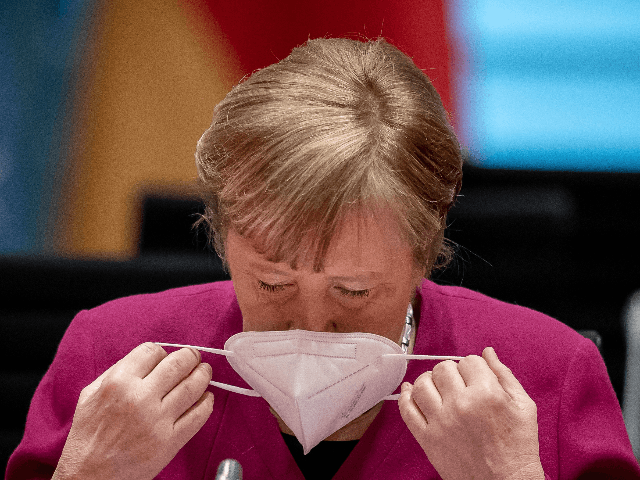BERLIN (AP) – Chancellor Angela Merkel’s “centre-right” party was headed for clear defeats in two German state elections on Sunday at the hands of popular governors from parties further to the left, projections showed — six months before a national vote that will determine who succeeds the country’s longtime leader.
Sunday’s votes for new state legislatures in the southwestern states of Baden-Wuerttemberg and Rhineland-Palatinate kicked off an electoral marathon that culminates in the national election on Sept. 26. The national vote will determine who succeeds Merkel.
Amid discontent over a sluggish start to Germany’s vaccination drive, with coronavirus restrictions easing only gradually and infections rising again, Merkel’s Union bloc has been hit over the past two weeks by allegations that two lawmakers profited from deals to procure masks early in the coronavirus pandemic.
Merkel’s Christian Democratic Union already faced a challenging task against the states’ well-liked governors. Projections for ARD and ZDF public television, based on exit polls and a partial count of votes, indicated that those governors’ parties — the environmentalist Greens in Baden-Wuerttemberg and the centre-left Social Democrats in Rhineland-Palatinate — were set to finish first, 7 to 9 percentage points ahead of the CDU. The CDU’s showings of about 23 per cent and 26 per cent, respectively, would be the party’s worst since World War II in both states.
“To say it very clearly, this isn’t a good election evening for the CDU,” said the party’s general secretary, Paul Ziemiak. “We would have liked different, better results.”
Wolfgang Schaeuble, the speaker of Germany’s parliament and a CDU heavyweight, argued that the governors’ personalities had been the decisive factor in the elections.
In Baden-Wuerttemberg, Germany’s only Green party governor, Winfried Kretschmann, has become popular with centrist voters in 10 years running a region that is home to automakers Daimler and Porsche. The region was dominated by the CDU until Kretschmann won power shortly after Japan’s 2011 Fukushima reactor disaster, which accelerated the end of nuclear power in Germany.
Kretschmann, 72, a fatherly figure with a conservative image, featured on Green election posters with the slogan “You know me.” That was a slogan Merkel famously once used in a pre-election debate to underline her own largely ideology-free appeal.
The Greens’ success bolstered their confidence for the national election campaign, in which the traditionally left-leaning environmentalist party is expected to make its first bid for the chancellery. Merkel isn’t seeking a fifth term after nearly 16 years in power.
The Greens’ national co-leader, Robert Habeck, described Sunday’s votes as “a super start to the super election year, and we will hopefully be able to take the tailwind from Baden-Wuerttemberg and Rhineland-Palatinate at full sail.”
Kretschmann has run Baden-Wuerttemberg since 2016 with the CDU as his junior partner, but may now be able to choose new allies.
The centre-left Social Democrats have led Rhineland-Palatinate for 30 years — currently under governor Malu Dreyer, whose personal popularity has kept her party’s support above its dismal national ratings. The Greens are a junior partner in her three-party governing coalition that also includes the pro-business Free Democrats, and looked set to improve somewhat on their showing five years ago.
The populist Alternative for Germany party appeared to have lost some support in both states, though still polled a bit over 10 per cent.
It was an awkward moment for new CDU leader Armin Laschet to face his first major test since being elected in January, as the “centre-right” considers who should run to replace Merkel as chancellor.
Many people had already voted by mail, so it’s unclear how far the scandal over lawmakers in the CDU and its Bavaria-only sister party, the Christian Social Union, allegedly enriching themselves through mask deals impacted Sunday’s vote. Nikolas Loebel, a CDU lawmaker from Baden-Wuerttemberg, and the CSU’s Georg Nuesslein have both quit their parties and say they won’t run for parliament again.
The Union bloc of CDU and CSU benefited from Merkel’s perceived good management of the pandemic over the past year. It still leads national polls by a distance from the Greens and Social Democrats, but this year has started badly. Germany’s vaccination campaign has been significantly slower than those of Israel, Britain and the U.S.
Laschet says that he and Markus Soeder, the CSU leader and Bavarian governor who is the other serious contender to run for chancellor, will decide on the “centre-right” candidate to succeed Merkel in April or May. Soeder’s political standing has risen during the pandemic.
“What we see today is that forming a government is possible without the CDU,” said the Social Democrats’ candidate for chancellor, current Finance Minister Olaf Scholz. “And that is what we are aiming for in the federal election campaign.”

COMMENTS
Please let us know if you're having issues with commenting.